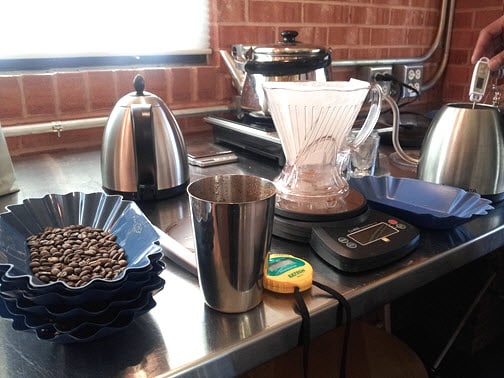Define the Study and Goals
The first step in DOE is to define the study and goals. Suppose your employer runs a medium-size coffee roasting business. You need to assess the strength of individually brewed, twelve ounce cups of coffee. Your goal is to determine which factors have an effect on coffee strength and to find optimal settings for those factors.
Response
The response is coffee Strength. It is measured as total dissolved solids, using a refractometer. The coffee is brewed using a single cup coffee dripper and measured five minutes after the liquid is released from the grounds.
Previous studies indicate that a strength reading of 1.3 is most desirable, though the strength is still acceptable if it falls between 1.2 and 1.4.
Factors
Four factors are identified for the study: Grind, Temperature, Time, and Charge. Coffee is brewed at three stations in the work area. To account for variation due to brewing location, Station is included in the study as a blocking factor. The following describes the factors:
• Grind is the coarseness of the grind. Grind is set at two levels, Medium and Coarse.
• Temperature is the temperature in degrees Fahrenheit of the water measured immediately before pouring it over the grounds. Temperature is set at 195 and 205 degrees Fahrenheit.
• Time is the brewing time in minutes. Time is set at 3 or 4 minutes.
• Charge is the amount of coffee placed in the cone filter, measured in grams of coffee beans per ounce of water. Charge is set at 1.6 and 2.4.
• Station is the location where the coffee is brewed. The three stations are labeled as 1, 2, and 3.
Table 3.1 summarizes information about the factors and their settings. The factors and levels are also given in the Coffee Factors.jmp sample data table, located in the Design Experiment folder.
|
Factor |
Role |
Range of Settings |
|---|---|---|
|
Grind |
Categorical |
Medium, Coarse |
|
Temperature |
Continuous |
195 - 205 |
|
Time |
Continuous |
3 - 4 |
|
Charge |
Continuous |
1.6 - 2.4 |
|
Station |
Blocking |
1, 2, 3 |
Note the following:
• Grind is categorical with two levels.
• Temperature, Time, and Charge are continuous.
• Station is a blocking factor with three levels.
All factors can be varied and reset for each run. There are no hard-to-change factors for this experiment.
The apparatus used in running the coffee experiment is shown in Figure 3.3. This is the setup at one of the three brewing stations. The two other stations have the same type of equipment.
Figure 3.3 Coffee Experiment Apparatus
Number of Runs
Based on the resources and time available, you determine that you can conduct 12 runs in all. Since there are three stations, you conduct 4 runs at each station.
